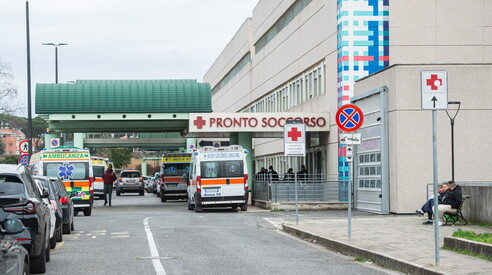Health developments: Il Foglio is right. Schillaci writes.


LaPresse
Healthcare taken seriously
Choose based on skills, spend more efficiently, and reduce local demagogy. The minister's healthcare strategy explained.
On the same topic:
Dear Editor, thank you for reminding us, with your article on the 23,500 Italian centenarians , that good news exists even when universal catastrophism seeks to obscure it. That ISTAT figure is a blow to professional pessimism. And it's also a perfect example of what's missing from the debate on Italian healthcare. The key word is: seriousness. The centenarians, which have doubled since 2009—a 130 percent increase in 16 years—tell us that our National Health Service, despite everything, works. Not perfectly, not uniformly, but it works. It guarantees life expectancies among the highest in Europe. And intellectual honesty would require us to start from this reality, not to absolve ourselves or deny the problems, but to understand what we've built and how to preserve it while we strive to improve it. You mention three points—spending better, choosing based on expertise, fighting territorial demagoguery—which are all examples of what I mean by rigor and responsibility. Seriousness means addressing problems while admitting responsibility. All of it. Because no one can cast the first stone on the overwhelmed National Health Service.
It has been fragmented into 20 regional systems without any real national direction, consistently underfunded for over a decade, and left to develop haphazardly. The result? Excellence here, disaster there. And never mind if you were unlucky enough to be born in the wrong part of the world. But we can no longer accept this: a citizen cannot pay with their health for being born in Puglia rather than Veneto. Seriousness means recognizing that good practices are not politically charged. That organizational appropriateness works regardless of who governs. Patriotism—a strong and necessary word—demands us to redouble our efforts to bring excellence everywhere. When a Neapolitan boards a train to have surgery in Brescia or Padua, it's not healthcare mobility. It's the defeat of an entire nation. It's the admission that the state has given up on guaranteeing equal rights. You say: choose based on expertise, not affiliation. I fully agree. But I would add: rigging performance data to maintain parameters and bonuses, manipulating statistics to secure end-of-year bonuses while citizens wait months for an oncology appointment, is not only shameful. It's inhumane. And even today, we still have to remind too many administrators that this is unacceptable. Seriousness means giving things a name and calling them what they are. On this, the Meloni government has taken a clear and rigorous approach from the very beginning.
The decree on waiting times has been in place for over a year. And those who are truly implementing it are reversing the trend: over a thousand hospitals have increased performance by 20 percent. The text clearly states who must do what, establishing precise rules. Because if a citizen is told that the waiting lists are closed, but if they magically pay, there are doctors, equipment, and public operating rooms available, we must call this phenomenon by its name: illegal, dishonest, and unworthy. It is culpable disorganization at the expense of the rights of the most vulnerable. But there is a level of responsibility that I directly call into question, as a doctor even before I do as a minister. That of those who have taken an oath to care for people. Saying no to those in difficulty to make room for those who can pay is not only unethical: it betrays the very reason one chooses this profession. I have been a doctor for thirty years, I have worked in hospitals, I know what it means. When you put on that white coat, the first question cannot be "how much do you have in your pocket?" But "what do you need?" The right to healthcare cannot depend on the ability to pay. If we accept this principle, if we let it pass as normal, we have already lost everything. We have betrayed not only the pact with citizens, but also with ourselves.
You're right when you write that we're throwing away 50 billion on useless tests and unnecessary drugs. Fifty billion. Admitting this is uncomfortable because it affects vested interests, the balance of power, and those who profit from disease. It's easier to say that there's always just a lack of money. Of course, more resources are needed. But if they're then wasted, left in drawers or diverted to cover budget gaps—and the Court of Auditors' data on unused regional funds is there to prove it—what's the point? You point out that 91 percent of centenarians live with their families, not in institutions. This is a crucial observation. It tells us where the future of healthcare is headed. This is the real revolution that awaits us and on which we're working: community healthcare, community medicine, integrated home care. Not cathedral-like hospitals in every corner of the city to please voters and cut ribbons. But widespread facilities throughout the region, telemedicine technologies, and teams that visit people's homes. Especially the elderly, the frail, and those unable to move. Seriousness also means having the courage to close departments that no longer make sense, to open community homes where they're truly needed, and to invest in home care technology. An uncomfortable reflection on the relationship between healthcare and consensus. Because it's easy to promise, hard to keep.
It's easy to identify the culprits, difficult to take responsibility. It's easy to announce momentous reforms, but difficult to actually implement them. Our approach is different: we focus on verifiable numbers, objective data, and targeted controls. Not on controversies. Not on headlines. We seek concrete solutions that last over time, and by definition, that takes time. The point is that seriousness can't be financed. There's no budget law that can allocate it, it can't be bought with billions from the National Recovery and Resilience Plan (NRRP). It's a cultural prerequisite, a mental habitus, an ethical choice even before a political one. It's deciding to look at problems for what they are, not how we'd like them to be. You write, and I agree, that the National Health Service is stronger when we describe it not as a problem to be demolished but as part of the overall solidity of a country. Italy's 23,500 centenarians demonstrate this every day. But to strengthen it even more, to make it last another fifty years, to leave it to future generations at least as we received it, we need something that no financial maneuver will ever be able to allocate.
We need rigor. In diagnosing problems, in choosing solutions, in patiently implementing reforms. We need intellectual honesty in recognizing what works and what doesn't, regardless of who made it. We need responsibility in making difficult and unpopular decisions when necessary. Without all this, we can allocate all the billions we want, we can write the most beautiful reforms in the world on paper. But nothing will change. Good news, as you say, never comes alone. But to make it arrive more often, to multiply it, we must earn it. With seriousness. With rigor. With responsibility. With respect.
Orazio Schillaci, Minister of Health
More on these topics:
ilmanifesto




